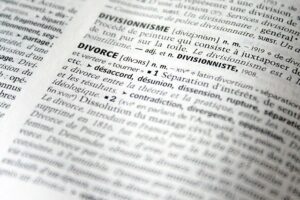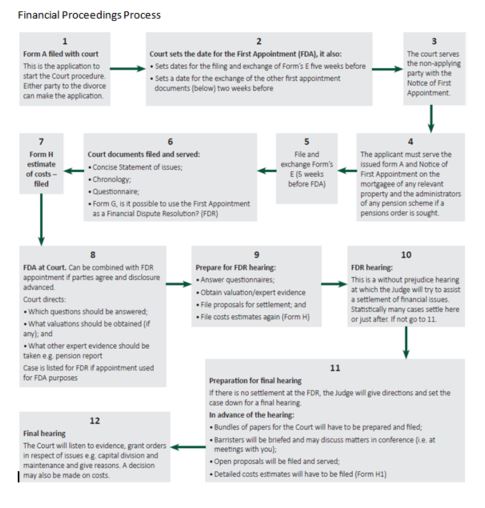Forms & The divorce process
INFORMATION GATHERING FOR NECESSARY FORMS
I would strongly suggest that if it is possible, to find out all the forms that you would have to complete in order to go via the legal/court route in order to be aware of the information/documentation that you would need to provide the solicitor. (the stages from the first appointment FDR to the final hearing,
Form D8: Apply for a divorce, dissolution, (judicial) separation or separation order
Form A, – Notice of [intention to proceed with] an application for a financial order
(how you fill out your financial statement (Form E) yourself I think this was published in 2018 by advicenow.org.uk
Form H,- Estimate of costs for a financial remedy hearing
Form G, – notice of response to First Appointment – It is a one page letter that the court will send out along with other paperwork. You use Form G to tell the court if you think you will be ready, or not ready to negotiate a settlement at the first appointment, you need to give your reasons why. You need to complete and return it to the court and a copy to the other side at least 14 days before the date of your first appointment
You might find these site below helpful:
Divorce Proceedings – Sharing Pension
Divorce & Civil Partnership dissolution Forms
During my online search I found out some of the questions a solicitor would ask;:
How much money is in the family pot? As my ex controlled all the finances, I had no idea which or how many bank accounts were in my name, his name, or joint names. But thankfully I knew that we had accounts in a few banks but not all. So I visited all most all the local banks to find out if I had an account with them in my name and in joint names. The banks will not divulge any information whether or not your partner had an account in his sole name in that bank. I requested for the past bank statements for several banks in order to give the information to my solicitor.
Have you prepared a list of your living expenses? I had to collect all the credit card statements from the bank to prepare a spreadsheet for my living expenses in order to complete the Needs Statement/form. You may want to add all the expenses you think you might incur in the future, such as mortgage/rent (if any), car expenses, entertainment expenses/gifts/donations/clothes/food etc (matching/reflecting the life you have been living).
Completing the documentation safely & thinking clearly
Looking back, now that I am in a good place, I would say there are a few things that I think that one would need to consider, for example,
It would be extremely helpful to have either family or a good friend to help, for example
- to keep all your paperwork (this could be all your bank statements, all your credit card statements, all your credit card receipts as these may be required to show as proof of your expenses), your jewelry if it is not in the bank.
- A space for you to work it may not be safe to work in your house, especially if your partner is a narcissist and/or an abuser
For fear that I may not get enough from the divorce settlement, I had to spend an enormous amount of time online. Here is what I found:
The Divorce Process, if you choose to go through the solicitor and/or the courts: (see diagram of the process below)
- The Petition
- The Response
- Acknowledgement of Service
- Petitioner to Apply for Decree Nisi along with Forms A, & E,
- Form A : the form which begins the Application for a Financial Order and which results in the Court setting the timetable. Form A: Notice of an application for a financial order
- Form E : If the application is for financial remedy please complete Form E1. You must send your filled-in Form E to the court and a copy to the other person, no later than 35 days before the date of the first appointment. You can find the date of the first appointment on Form C (Notice of a first appointment) which the court will send to you. It is a formal disclosure of the assets, income etc of each party in the standard form required by the Court. You must give to the court a full, frank and clear disclosure of all your financial and other relevant circumstances. (how you fill out your financial statement (Form E) yourself I think this was published in 2018
- 43 days after the Decree Nisi. The Petitioner can make application for Decree Absolute but it is advisable to wait until you have dealt with the matrimonial finances before the decree absolute application is made. In order to be protected from any future claims, a clean break Consent Order is required. Form E: Financial statement for a financial order
- First Directions Appointment (FDA) : first hearing in connection with a financial dispute on divorce. The solicitors must identify the issues and deal with the need for any further questions to be raised or valuations to be obtained. The Court will then make the appropriate orders at the First Directions Appointment (FDA).
The First Directions Appointment is commonly referred to as the ‘First Appointment’ or ‘FDA’. This is the first hearing that takes place during the court financial proceedings part of a divorce. It constitutes a general ‘house-keeping’ hearing to work out and agree the next steps required to prepare a case for financial settlement and a timetable of deadlines for each step to be met.
The aim of the hearing is to put the parties in a position where they can confidently, in an informed manner, negotiate at the second hearing stage, by which point all issues, assets and liabilities should have been disclosed and identified. This second hearing is called the Financial Dispute Resolution Hearing (FDR).
It is important to note that at every stage during proceedings,the court will consider whether alternative dispute resolution is more appropriate. Where deemed more appropriate, the court can adjourn proceedings, so that this avenue can be set up and explored.
- Financial Dispute Resolution (FDR) : the second hearing within financial proceedings upon divorce. The Court lists the matter for a Court-assisted Mediation known as a Financial Dispute Resolution (FDR) hearing. The District Judge listens to each party’s case and gives an indication as to an appropriate division. The parties are given time to talk at Court to see if the matter can be agreed on that day. If agreement is reached it can be recorded by way a Consent Order at the Court. If no agreement is reached, then the judge lists the matter for a final hearing.
- Final hearing : a trial where detailed evidence is heard from both parties. A different District Judge to the one who heard the Financial Dispute Resolution (FDR) will hear the case in full and listen to the evidence of the parties, which includes the disclosure previously submitted, and the Judge will then decide on the division of the assets between the parties, making an Order on that day.
Settlement proceedings
Settlement proceedings should be going on at the same time as your divorce proceedings; however, finalisation of your divorce will usually be delayed until any financial disputes have been resolved. See section Finances
The main court process for divorce cases:


